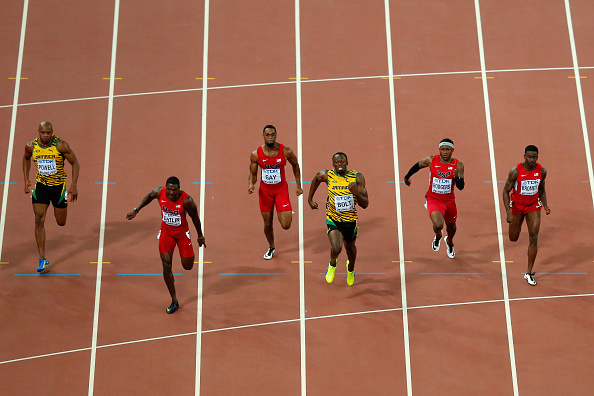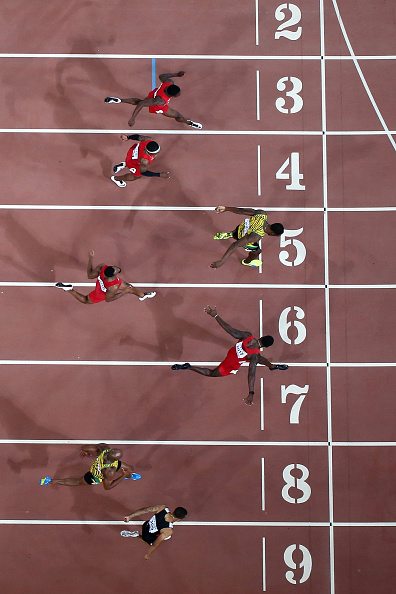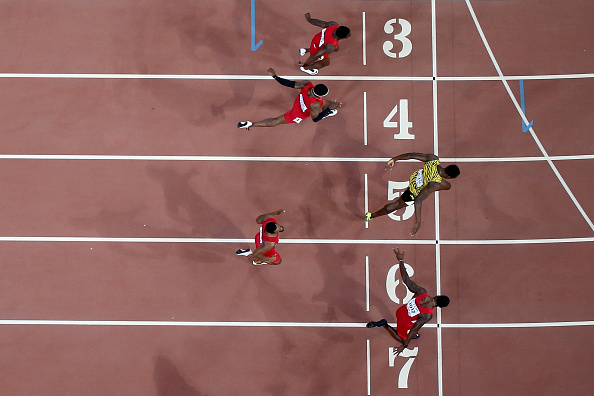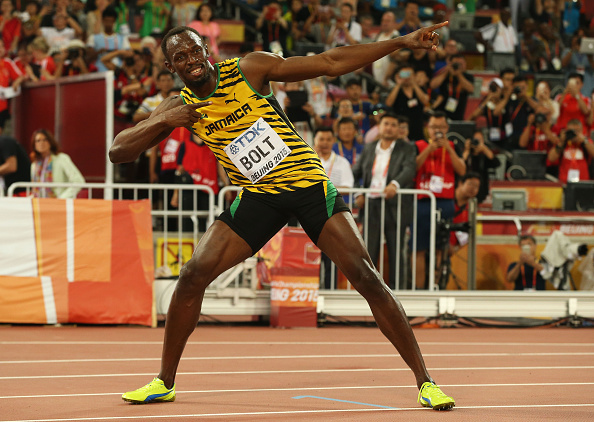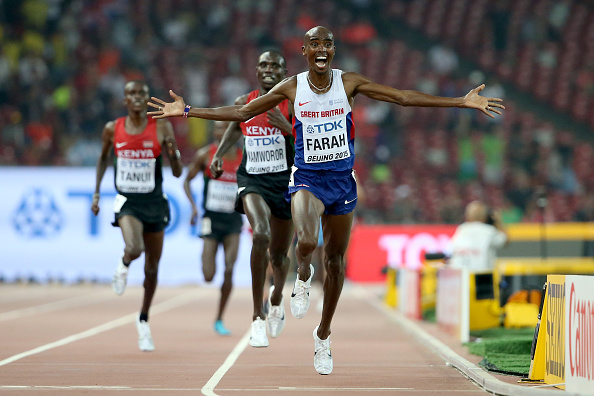BEIJING — The 10,000 meters is why track fans who are track fans are, really, track fans and those who are not track fans, well, aren’t.
It’s 25 laps around the track. The best men in the world run it in about 27 minutes.
It starts slow and finishes fast. Really fast.
It’s a race of will, skill, tactics, tenacity and great theater.
On Saturday at the Bird’s Nest, the first night of the Beijing 2015 world championships, Britain’s Mo Farah affirmed his standing as the best in the world, winning the 10k in 27:01.13. Two Kenyans, Geoffrey Kamworor and Paul Tanui, took second and third. The American Galen Rupp finished fifth.
To the beat of 16 drummers banging on giant red drums along the homestretch, Farah — in his typical style — unleashed a ferocious kick over the last lap and particularly the final 100 to claim his fourth world championship gold. The winning time made for a Bird’s Nest record, by three-hundredths of a second.

The 10k went down after an evening that saw another jaw-dropping Bird's Nest opening ceremony — no drums this time, as at the start of the Beijing Olympics seven years ago, but plenty of dancing, singing and more — and, then, the first rounds of the men’s 100, dominated by Justin Gatlin in a (slightly) wind-aided 9.83 seconds.
In women’s shot put, Michelle Carter took third, just the second-ever American woman ever to win a medal in the event -- and the American team's first medal of the championships. Germany’s Christina Schwanitz won, China’s Lijiao Gona grabbed second.
The drumbeat heading into Saturday at the Bird's Nest had been doping, doping, doping -- and not much else.
Rupp and the Somali-born Farah, training partners at The Oregon Project under Alberto Salazar, have for months been fending off doping-related inquiries.
Gatlin, in the minds of many in the press, particularly the feral British media, came here as the symbol of a sport ever-afflicted by doping, the consequence of his two failed tests, the first for ADD medication in 2001, the second for a testosterone bust in 2006 — even though a read of the record makes it abundantly plain such a characterization is entirely unfair.
Bolt, meanwhile, returning to the scene of the first of his Olympic golds and his 9.69, then a world record (he would lower it the next year at the Berlin 2009 worlds to 9.58), was cast as all-around good guy, maybe even savior of the sport — a role he explicitly, at a pre-meet news conference, declined.
Even the International Olympic Committee president, Thomas Bach, was asked about doping, and not just once, at a Friday news conference.
Bach's answers, meantime, ought to serve as a vivid reminder that the world can be fraught with moral judgments that don’t serve to accomplish much of anything. As Bach made plain, we live in a world of grays, not black and white — of rules, laws, transgressions, sanctions, redemption and opportunity.
Bach was asked whether he — emotionally — could get behind a lifetime ban for doping.
“If you ask me about my emotions,” he said, “I would say clearly yes, a lifetime ban I would still support.”
But, he went on, “I had to learn from different courts and lawyers, like [IAAF president-elect] Sebastian Coe and others who were asking for this, that this is legally just not possible. A lifelong ban would not stand any kind of challenge. We have to accept this.
“… If you have an athlete who has served his suspension, then he has the right to participate in championships. There I can remind you that we made an effort once to change this, for the Olympic Games, with the so-called ‘Osaka rule,’ “ which would have barred participation in the next edition of the Games for an offender, “and again we lost the court case — that this is not possible.
“The suspension is there and afterwards we have to treat these athletes in the same way like the others.”
A few moments later, Bach was given this example — if a civil servant makes a mistake, he or she is out of a job. Why not the same for an elite athlete?
“This is a different kettle of fish,” he said.
“We have had examples for the sentences, the judgments made by courts. It’s a legal question. We are not allowed to go further to take stricter sanctions. It’s a question of human rights. I’m not going to give you a lecture here. It’s a question of human rights, and we must admit these facts.
“Also, we must be conscious of the fact that the fight against doping is not only a question of sanctions. It’s also a question of efficiency of test systems, it’s prevention as well and other measures.”
Doping, doping, doping — and then, finally, Saturday night, some running and throwing. Would it quiet the chatter?
Not on your life.
Gatlin, asked the inevitable question in a post-race interview, said, “Understand it has been 10 years since I’ve done that. It has been 10 years since that happened to me. And I’m here doing better things. So everybody needs to drop it.”
In the first heat of the men’s 100, Jamaica’s Asafa Powell, in the inside lane, went 9.95 — the 91st official sub-10 of his career. (Only a skeptic would note that Powell, a former 100 world record-holder, himself served a doping ban.)
Next heat: the American Tyson Gay, into a slight headwind, 10.11 for the victory. (Attention, skeptics: Gay, the American record holder, 9.69, has also served a doping ban.)
Third: Femi Ogunode, the Nigerian-born sprinter who runs for Qatar, took the heat, in 9.99. (Skeptics: Ogunode served a two-year doping ban that ended January, 2014.)
Fourth: the American Trayvon Bromell, in his second international meet, his first major meet, rocked the occasion by bringing back the short shorts. In the outside lane, he eased up and still went 9.91 for the win. Yow.
Fifth: France’s Jimmy Vicault in an easy 9.92, Canadian Andre DeGrasse — the Pan Am Games and NCAA champion from USC — in 9.99.
Sixth: Gatlin gave the camera two kisses, then two fists together in a show of strength, then — in the outside lane — ripped off a wind-aided 9.83. Wind-aided but just barely — the wind .1 over the limit at 2.1 meters per second. The last few meters — Gatlin didn’t even run hard.
“I just did what my coach said," Gatlin said afterward, a reference to Dennis Mitchell, "and go out there and dominate the first part of the race.”

Seventh: Bolt made a show for the cameras of “running” with his fingers. Settling in to the blocks, he crossed himself, then pointed to the sky. He then lumbered out of the blocks and jogged to victory in 9.96. The American Mike Rodgers (skeptics — Rodgers also served time off for doping) took second, in 9.97.
Bolt, afterward: “Overall, it was good,” fifth-best overall in qualifying, then conceded not “as great as I want it to be.”
That 9.96 was, for Bolt, fast for an opening round. At those 2009 worlds in Berlin, he went 10.2 in the first round; 2011 worlds in Daegu, South Korea, 10.1; at the London 2012 Olympics, 10.09; at the 2013 worlds in Moscow, 10.07.
Ultimately: Berlin, world record; Daegu, false start and DQ; London, gold; Moscow, gold.
Gatlin took third in 2012, second in 2013.

Bolt also said, “I know Gatlin was running very easy but that is how it is. I am not worried.”
Gatlin on Bolt: “He did the same thing in 2012. He ran kind of slow in the first round, picked it up in the semis, first in the finals.”
That’s exactly it — for all the intrigue of the first round, the semifinal heats will be far more telling.
As Maurice Greene, the Sydney 2000 100 gold medalist here as a broadcaster, had said Friday, “The semis is going to be able to tell a lot. It’s really going to show you if Bolt is really ready. Then you will be able to make your decision about the final.”
The 10k is, of course, far too demanding for rounds. It’s one shot, and one shot only.
In Daegu, Ethiopia’s Ibrahim Jeylan ran the last lap in 52.7; Farah, 53.36. Farah’s silver made for Britain’s first-ever medal in the 10k — but Jeylan was the winner, in 27:13.81.
Since then, in international majors, the 10k has been all Farah: gold in London, gold in Moscow. In 2013, Jeylan took second. The difference: Farah kicked the final 100 in 12.82, Jeylan 13.15.
In London, Rupp took silver; he had been eighth in Berlin in 2009, seventh in Daegu; then took fourth in Moscow.
No non-African born runner had won a medal at a 10k worlds since 1987, when Francesco Panetta of Italy took silver. Could Rupp?
Farah, meanwhile, was seeking to become the first non-Ethiopian multiple worlds 10k winner.
The first lap Saturday went 68:39. Typical.
The field went through one kilometer in 2:52.7, two in 5:32.1, three in 8:15 — a very quick 27:30 pace.
At 5k, 13:40, Rupp running sixth, Farah seventh.
At 6k, 16:22, Rupp up to third, Farah fourth.
By 7k, the 22-year-old Kamworor had made a move into the lead, at 19:06. He is the 2015 world cross-country champion, the 2014 world half-marathon winner. Tanui was second, Farah third, Rupp fourth.
At 8k, Kamworor was timed in 21:49.99, Farah 26 seconds back, Tanui 26-hundredths back. A third Kenyan, Bedan Karoki Muchiri, was 46-hundredths back. Rupp, 62-hundredths. Everyone else — far behind.
With three laps to go, Farah moved to the lead. Kamworor immediately took it back.
They stayed that way with two to go. On the homestretch, the drummers started pounding.
One lap: Farah in front, Kamworor on his shoulder, and the lapped runners getting in the way, Farah stumbling ever-so-much with perhaps 350 meters to go but just as quickly recovering.
Down the homestretch, Farah pulled away. That winning time again: 27:01.13.

Kamworor — still learning how to run on the track and so a force with which to be reckoned come next year, and the Rio Games — crossed 63-hundredths back.
Kamworor joined two legends of the sport, Britain’s Paula Radcliffe and Kenya’s Paul Tergat, as the only runners to win worlds cross-country gold, worlds half-marathon gold and worlds 10k silver. No one has ever won gold in all three races.
Tanui took third, 1.70 behind.
"We worked as a team trying to beat Mo Farah," Kamworor said. "But he is a tough guy to beat. I learned a lot from this race. It was very tactical, very slow from the beginning but getting faster and faster.
"I must say I am happy for our performance, medal counts, and with such a fierce competitor as Farah, silver counts."
Muchiri ran a season-best 27:04.77 for fourth, Rupp a season-best 27:08.91 for fifth.
"I'm definitely disappointed," Rupp said, adding, "I just didn't have it today."
Farah ran the last kilometer in 2:28.81, Kamworor in 2:29.46.
"I nearly went down," he said, "but I managed to stay on my feet, thank God, and win the race. I just get to keep doing what I'm good at, and that is running and winning medals for my country.
"I just have to concentrate on winning my races. I do it for my family and the people behind me, for my wife and my kids."
Farah ran the first 5k in 13:40, the second in 13:21.
Seven years ago in Beijing, knocked out of his Olympic heat, Farah ran 13:50.
His last lap Saturday: 54.14 seconds.
Talk amongst yourselves. The 100 final goes down Sunday night.






